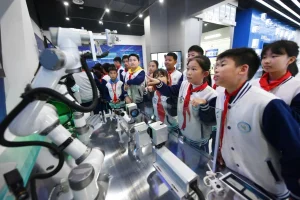Yuan Chao has broad commercial practice, focusing mainly on contentious work and non-contentious work in the area of company law, commercial disputes and insolvency, trusts, etc., and leads a team which dealt with hundreds of dispute cases a year, with a full spectrum of issues between and within companies. He speaks with us this month on provisions which have occurred in the People’s Republic of China, the difficulties he faces during insolvency and why he thinks dispute resolution is a waste of time.
On 1 September 2017, Provisions of the Supreme People’s Court on Several Issues Relating to Application of the Company Law of the People’s Republic of China (IV) took effect; can you explain the changes which have had big impact on your clients?
The Provisions of the Supreme People’s Court on Several Issues Relating to Application of the Company Law of the People’s Republic of China (IV) (‘the Company Law Interpretation IV’), from my point of view, is the confirmation of the common practice from the Supreme People’s Court, which gives clear indication and guidance to the decision-making process of a company. I used to deal with the disputes in relation to the preemptive right of the shareholders during equity transfer, and major shareholders’ expropriation; after the Company Law Interpretation IV took effect, the remedies available are clearer.
What changes are you looking forward to with the new judicial interpretation on corporate law being released by PRC Supreme Court? Which do you think is the biggest change?
PRC Company Law has a sound system but lacks details, which gives arise of uncertainty and disunity in application and adjudication. Until this year, four judicial interpretations have been issued, which makes the details clearer and has enabled practicality.
What regulations do you think could be amended in order to ease international trade into and from China?
A number of uniform rules and conventions are adopted in international trade, such as UN Convention on Contracts for International Sales of Goods (CISG), Incoterms, UCP, etc., and the Chinese Contract Law referring to CISG to a large extent, for instance. To ease the international trade into and from China, I think it is important to establish a sound system of service of court documents, recognition and enforcement of Court judgements.
What is the biggest difficultly you face when undergoing corporate insolvency projects?
From its appearance, the biggest difficulty lies in the process of reaching the agreement by creditors of various priorities and adopting the restructuring scheme accepted by all the interested parties: the creditors, purchasers, and the insolvent itself.
However, in practice, it occurs to me that the biggest challenge is that when the insolvent is trapped by the irregularities or even crime, such as: financial fraud, illegal fund-raising, etc, what should be dealt with by the administrator. The administrator, a new insider and supervisor of the insolvent, should have the guts to decide whether any of the irregularities should be reported to the criminal judicial bodies, or be dealt with through civil and commercial procedures because no crime is constituted.
What could clients do to ensure this process runs as smooth as possible?
It is critical to have good communication with the governing court and the local government.
How are you hoping to see the Chinese legal sector progress in the future?
It is not the wind, not the trail, the benevolence. The advance of legal system lies in the mind of people, the key is that the moral bottom line of people, otherwise, legislation becomes a futile attempt. From my point of view, the laws in China are too loose rather than too harsh. The Criminal Law tends to punish lightly and though the chief sentence cases are lower, the number of crimes does not reduce, thus severe punishment should be used as a warning to others. In Civil Law, the liability of the breach of contract is limited by the reparation of the loss, up to 130% of the loss proved by the aggrieved party. However, in practice, it is quite difficult to prove the loss, which results in unfair compensation for the aggrieved party, but unjust enrichment on the part of the defaulted party. Persist in so doing, spirit of contract is demoralised, due to the cost for the breach is low.
You deal with hundreds of dispute cases a year, with a full spectrum of issues between and within companies; which are your favourite and why?
Disputes resolution wastes manpower and money; the war is disruptive, which is the last resort, the same as litigation, no choice is left but to file a lawsuit. Therefore, my favourite approach is to find a way for the parties to continue their cooperation through via effect of the lawyers. Just the same as a story written in Chinese history, the manoeuvre by Gongshu Ban and Mo Di: when all the facts and the laws can be illustrated, the advantage and the disadvantage can be forecasted, the parties may understand their position better before the lawsuits, and settle their disputes.
What would you claim is key to being successful in your role?
I have never felt that I am successful, I always do as what I think whilst being discreet.
YUAN Chao
Partner
Commerce & Finance Law Offices
6F NCI Tower, A12 jianguomenwai Avenue Beijing 100022, People's Republic of China
Tel: 8610-6569 3399
Mobile: 86-138 1053 0528
Yuan Chao graduated from the University of International Business and Economics (UIBE) with a Bachelor of Laws in 2007 and a Master of Laws on International law in 2009. Mr Yuan joined our firm in April of 2008, specializing in legal advisory services such as the review of contract for domestic and international sales of goods and dispute resolution, including dispute resolution for the guarantee, letter of credit cases in international financial settlement; international sales of goods cases in international trade. Mr Yuan also provides non-litigation legal services such as IPO and M&A, etc. Mr Yuan’s working language is Mandarin and English.
He also advises on corporate finance, debt distress and corporate insolvency projects. His practice covers all the stages of the life of a company, from establishment to insolvency. Yuan Chao also specializes in the international trade and trade finance, he deals with numbers of milestone cases in application of UCP, URDG and other ICC rules.
Commerce & Finance Law Offices is one of the leading private law firms in China. Founded in Beijing in 1992, Commerce & Finance has steadily built up its practice and reputation. Today, the firm's fifty-seven partners and one hundred and thirty-two associates represent a wide range of foreign and domestic clients. We have established branch offices in Shanghai and Shenzhen and, commensurate with the ever-increasing success of our clients, we continue to develop close working relationships with major law firms in many other jurisdictions.
Our clients turn to us not only because we are a full-service law firm, but also because we have accumulated the professional knowledge and skills necessary for working successfully in Chinese and foreign business environments. Our multi-national list of clients attests to this. Commerce & Finance is able to bridge business cultures because we have a diligent team of attorneys who have acquired training and exposure in diversified areas of legal practice.




















